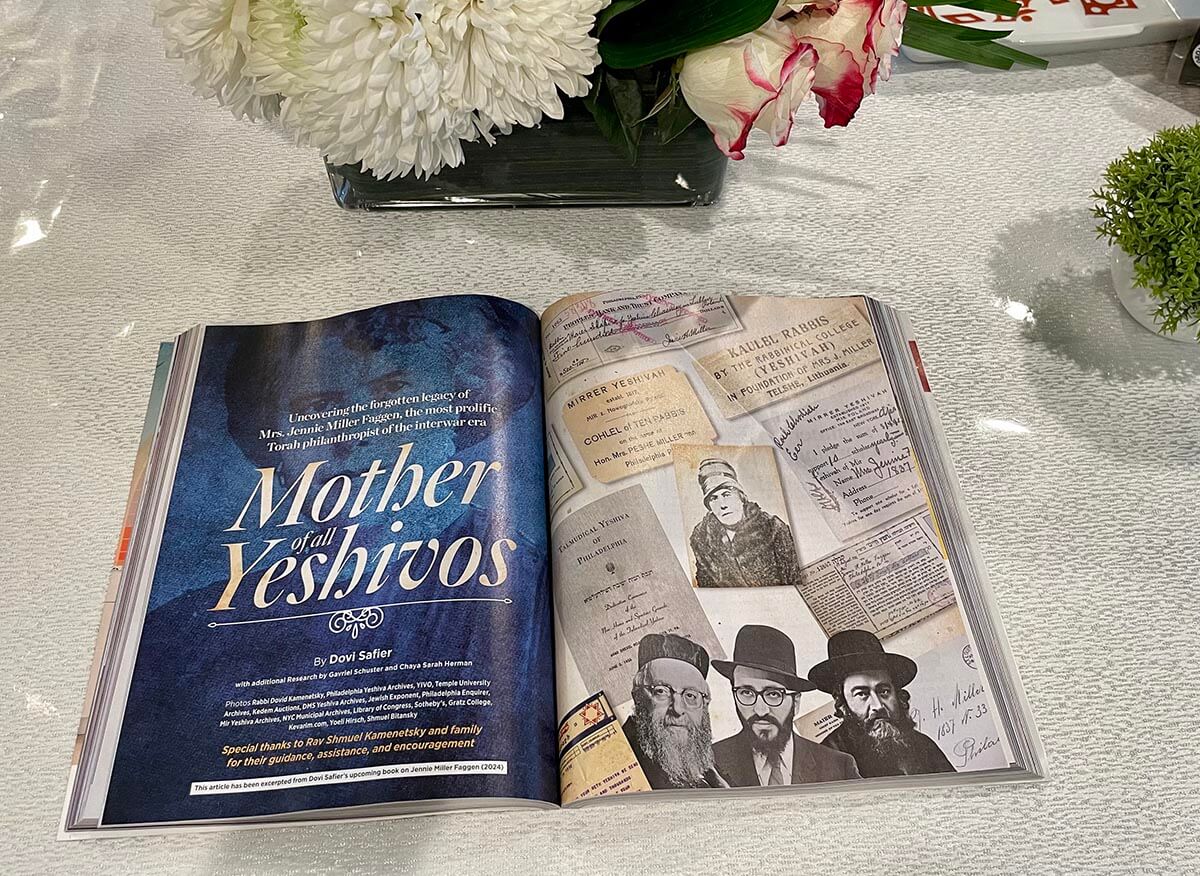In rare move, haredi magazine publishes photo of a woman — a forgotten donor to European yeshivas
Jennie Miller Faggen donated tens of thousands of dollars to yeshivas in the 1920s, but her contribution has largely been forgotten

The story about Jennie Miller Faggen in Mishpacha Magazine. Photo by Rachel Benstein
(JTA) — When readers of Mishpacha magazine opened up the Passover issue, they found two surprises. The first was the unsung, mysterious story of a prolific American philanthropist, Jennie Miller Faggen, who supported dozens of European yeshivas before World War II.
The second was a rarity in the world of haredi Orthodox publications: Miller’s photograph.
Mishpacha and other haredi magazines have long refrained from publishing photos of women, though some exceptions have been made. The publications’ editors cite traditional haredi mores regarding modesty and shielding women’s appearances. Feminist groups in the Orthodox world and elsewhere, however, say such policies demean women and aid in their erasure from the public sphere.
Mishpacha did not respond to requests for comment as to why and how it decided to include the picture of Miller, who donated tens of thousands of dollars to Orthodox educational institutions in the 1920s. Nor did Dovi Safier, who authored the article as well as a book about Miller called “Mother of all Yeshivos.”
It took me 3 years to truly uncover the lost legacy of Mrs. Jennie Miller Faggen—an extraordinary Philadelphia woman whose unmatched generosity upheld the Torah world during the challenging interwar years.
— Dovi Safier (@safier) April 2, 2023
“Mother of all Yeshivos” is a chronicle of my pursuit to reconstruct her… pic.twitter.com/Uopn1h5VET
But Orthodox feminists took notice of the photo, which depicts Miller wearing a hat and is shaded in blue. The cover of Safier’s book features the same image and design. The print version of the article also included a photograph with the face of another woman — Rebbetzin Temi Kamenetsky, the late wife of Rabbi Shmuel Kamenetsky, a prominent Lithuanian haredi rabbi who lives in Philadelphia.
“How wonderful to hear and see that @themishpacha included these images in this week’s edition,” Chochmat Nashim, an organization that fights extremism and sexism in the Orthodox community, posted on social media last week. “We CAN come back from the trend of erasing women and include the entire Jewish family & community in our visual depictions. Ken Yirbu [the more the better].”
Historian Rivka Press Schwartz tweeted, “I’m one of those Orthodox feminist nudniks who doesn’t buy your publication because of no pictures of women. Bought your Pesach issue because of @safier’s article about Jenny Miller Faggen–and because I saw you included pictures of her. Incredible.”
Safier uncovered Miller’s philanthropic pursuits through a three-year-long reporting effort that took him through archives, letters and a Rolodex of prominent rabbis. Miller Faggen, who was born in New York but spent much of her life in the Philadelphia area, funded dozens of yeshivas across Europe and the United States, and hosted prominent rabbis at her 18-room home in the Strawberry Mansion neighborhood of Philadelphia. Widowed twice, she inherited the bulk of her wealth from her first husband’s business in the city’s booming textile and real estate industries. Many of her contributions were forgotten when the yeshivas she supported were destroyed during the Holocaust.
This is not the first time Mishpacha has published photos of women. Articles in 2021 about a turn-of-the-20th century Jewish nursing home in New York City, and about the Holocaust in Telz, Lithuania, each contained prewar photos of women. Responding to a tweet about the photo of Miller in his latest article, Safier wrote, “Far from the first time. But I guess because the story is about a women [sic] it’s getting more attention.”
Mishpacha attracted particular attention in November 2016, ahead of that year’s election, when its cover image included profile views of Donald Trump and Hillary Clinton facing each other, both in negative exposure and both covered in collages of their campaign symbols. After the issue was published, an editorial from Hamodia, an Israeli haredi paper, denounced the decision, arguing that a “true” haredi publication would never show an image of a woman.
“There are no – there haven’t been, and there won’t be – any pictures of women in the true haredi press, not of those who have reached high positions of sovereignty and power in their countries, and also not pictures of women in Jewish life,” the editorial read. “These are our ways of life, these are the fences that surround them, and they don’t change, and aren’t connected to political circumstances.”
A contributing editor for Mishpacha, Sruli Besser, responded at the time that the magazine engaged in “hours of conversation and deliberation with real rabbanim,” or rabbis, before arriving at the decision to print a version of Clinton’s picture.
This article originally appeared on JTA.org.














